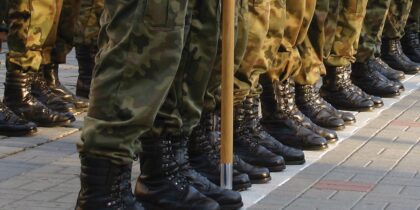Earlier this week, the House of Commons Defence Committee released the long-awaited Part Two to its report on Mental Health and the Armed Forces, specifically looking at the provision of care across the UK. Through the Centre’s partnership with Forces in Mind Trust and Contact we have reviewed the report and the important issues it raises.
It is important to remember first of all that the majority of veterans do well after their time in service, but that a small minority do experience problems: in physical health, finance, relationships and indeed mental health, to name but a few. Veterans who do experience difficulties need effective support to ensure that they have the best chance to live a sustainable and happy life, and we welcome the Defence Committee’s commitment to champion their needs. We agree that more needs to be done to support veterans with mental health difficulties and welcome the Committee’s support for a further increase in spending to support those who need it. The report has certainly served as a valuable stimulus for debate about how well we are serving the veterans who have served us.
We agree that more needs to be done to support veterans with mental health difficulties and welcome the Committee’s support for a further increase in spending to support those who need it.
However, the report includes some points that require further debate. The report highlighted the budget of £10 million for veteran-specific services in the UK, labelling the figure ‘scandalous’ when compared to the NHS budget of £150 billion. Aside from questions over the accuracy of this figure, comparing veteran-specific service budgets to that of the entire NHS is flawed and misguiding. A more appropriate comparison would be to mental health funding specifically, which for England was £11.9 billion last year. More importantly, veterans can, and in most cases do, access mainstream NHS mental health services. The £10 million for veteran-specific services should be viewed as a ‘top-up’ to mainstream mental health services not a replacement.
It is also crucial in the reporting of veterans’ mental health that we talk about issues in a measured way and avoid crude stereotypes. None of us wants a return of the ‘mad, bad and sad’ myths of veterans returning from overseas conflicts of the early 2000s.
Importantly, veterans can, and in most cases do, access mainstream NHS mental health services. The £10 million for veteran-specific services should be viewed as a ‘top-up’
The report strongly recommends that a new centre for veterans with a mental health diagnosis should be established at the Defence and National Rehabilitation Centre at Stanford Hall within 12-18 months. Not only is this unrealistic given the overall state of mental health provision and staffing shortfalls nationally, but a centre such as this may not be the best use of limited resources. Given the time required to travel and attend, the centre’s benefits would be limited to veterans living in England, and it could cause the same difficulties as other ‘out of area’ admissions across the NHS. Arguably, what is needed are more locally embedded services for veterans who can help them sustain their recovery within their own community. While additional resources for veterans’ mental health services would be very welcome, the allocation of public funds to such a centre should not take place until a proper consultation has established the need and desire for it.
When considering the varying service architectures across the devolved nations, the report’s approach to UK-wide cooperation may be overly-simplistic. While defence is an issue legislated by central government, national health policy is not. Any attempts by central government to organise collaborations must be aware that, whilst pan-UK consistency may be appealing, few non-governmental organisations have the resources to consistently operate across the UK. Additionally, given the devolved nature of health policy, the four devolved NHS administrations need not agree to a course proposed by Westminster, and this is likely to impact on any central decrees around the consistency of veteran treatment.
A new centre could cause the same difficulties as other ‘out of area’ admissions across the NHS… what is needed are more locally embedded services for veterans who can help them sustain their recovery within their own community
Finally, the report’s encouragement for the MoD to support Contact’s work in co-ordinating the sector is welcome, as Contact is the only group that has a sufficiently broad role to achieve this aim across the four nations and the statutory and third sectors. However, Contact operates on a relatively small short-term grant and further resources will be needed to achieve the scope of activities described in the report.
We recognise the intent and desire from the Defence Committee to tackle the issues that face veterans with mental health difficulties and it’s promising to see these discussions taking place at the very highest levels. However, the report is likely, in practice, to do little to alleviate the situation for those who need support. We’re therefore calling for the development of solutions that can truly meet veterans’ needs in a responsible and sustainable way.





